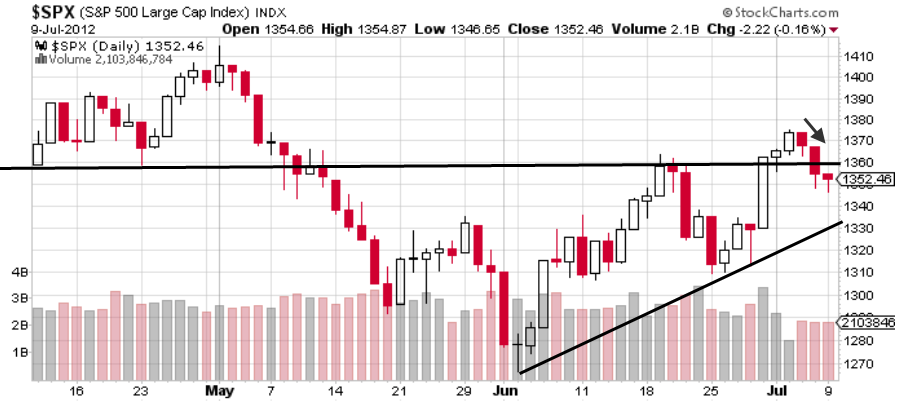Goldman Sachs and some other Wall Street banks are recommending investors cut their exposure to emerging markets after a miserable 2013 for the unloved asset class. But should investors heed the advice?
In a December report, Goldman analysts said there is a strong possibility that developing markets underperform and experience heightened volatility over the next five to 10 years. They said investors with a moderate risk tolerance should cut their exposure to emerging markets to 6% from their earlier recommended allocation of 9%.
It’s not time to increase portfolios in those markets, even though it may seem attractive because investments appear to be cheap, Goldman warned, according to a CNBC report.
“Wall Street’s biggest banks say the slump in emerging-market assets that left equities trailing advanced-nation shares by the most since 1998 last year will prove more than a fleeting selloff,” according to a separate Bloomberg News report.
iShares MSCI Emerging Markets ETF
The iShares MSCI Emerging Markets ETF (EEM) lost about 4% last year, while SPDR S&P 500 ETF (SPY) rallied more than 30%. Concerns over rising U.S. interest rates and Federal Reserve bond tapering may have been a factor in the underperformance of developing markets. Emerging markets are reliant on foreign capital, so tighter credit markets and higher interest rates are seen as negative factors.
And emerging markets are off to a rocky start in 2014 due to falling currencies, fears over slowing economies, and political instability in countries such as Turkey, Brazil and Thailand.
However, John Frankola, CFA, who manages the Core Equity and Core Holding portfolios on Covestor, says investors should resist the urge to sell out of emerging markets due to their recent poor performance. He owns Vanguard FTSE Emerging Markets ETF (VWO) in both portfolios.
“Chasing hot performance and selling poor-performing sectors are some of the biggest mistakes that investors make over and over again,” Frankola said.
“History shows that some of the best long-term buying opportunities in markets are when everyone hates an asset class and it’s relatively cheap,” he added. “Emerging markets seem to fit the bill, and they also have diversification benefits.”
According to Morningstar data, iShares MSCI Emerging Markets ETF has a price-to-earnings ratio of 10.7 based on forward-looking earnings, compared with 15.8 for SPDR S&P 500. The valuation difference is even more pronounced in smaller stocks. For example, WisdomTree Emerging Markets SmallCap Dividend (DGS) has a p/e ratio of 10.8 versus 19.7 for iShares Russell 2000 (IWM).
“We’ve also had an unusual year in 2013 when emerging markets underperformed developed by such a large degree,” Frankola said. “I’m not saying investors should simply buy underperforming sectors, but emerging market valuations are below the averages of the past 15 years. Also, emerging markets have faster economic growth rates and a rising middle class.”
Goldman’s call to cut emerging markets exposure after the asset class’ poor performance has raised some eyebrows. A few years ago, many Wall Street analysts were bullish on developing markets after they outperformed the S&P 500 in 2009 and 2010 coming out of the financial crisis. Now, some of these same strategists are bearish on emerging markets after two years of underperforming developed.
“It’s strange that some Wall Street firms are turning negative on emerging markets now after they underperformed so badly in 2013,” said Tom Yorke, who manages the Global Diversified Aggressive portfolio on Covestor. “If anything, I’m more interested in areas of the market that have underperformed, like emerging markets.”
Some other managers are also upbeat on the the sector. Prudential Financial (PRU) is considering a boost to its investments in emerging markets after they lagged developed country stocks.
“I’ve got that itchy trigger finger,” said Ed Keon, a managing director and investment manager at Prudential’s Quantitative Management Associates, in a Bloomberg report. “I wouldn’t be shocked if our next move in emerging markets was to be a buyer before this year is out … Investing when things look rough, that’s when your opportunities for upside are greater.”
Photo Credit: UweBKK
DISCLAIMER: The investments discussed are held in client accounts as of December 31, 2013. These investments may or may not be currently held in client accounts. The reader should not assume that any investments identified were or will be profitable or that any investment recommendations or investment decisions we make in the future will be profitable. International investing involves special risks, such as political instability and currency fluctuations. Past performance is no guarantee of future results.





